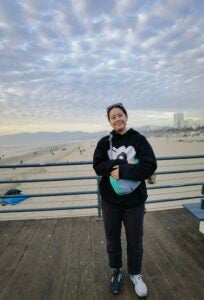Alessandra Beelen

Education: B.S. in Biochemistry and Molecular Biology, University of California-Davis, 2022
From: Hangzhou, China
Joined David Lab: June 2022
Outside of lab: I enjoy watching sports, such as F1 and basketball, and travelling!
Research in the lab: Although much of the research in the David lab focuses on MUTYH and its ability to recognize and repair OG:A mismatches, we are also curious in its role beyond identifying such lesions. MUTYH has shown to mediate cytotoxicity with various chemotherapeutics and UV light. These MUTYH-dependent sensitivities in the cell may also vary depending on the mutant variants of MUTYH. My project involves using both in vitro and cell-based assays to better understand the molecular basis behind this process.
Previous Research Experience: During my time at Davis, I worked in the Niño Lab studying honey bees. I was involved in three different projects involving a mixture of lab and field work. The main goals of these projects were to see if we could increase honey bee health and longevity to better support beekeeper’s needs or determine bee stocks that are more suitable in California’s Central Valley Mediterranean climate. I also joined the David Lab and worked with Melody on synthesizing transition state that are incorporated in oligonucleotides to serve as inhibitors of base excision repair glycosylases.
